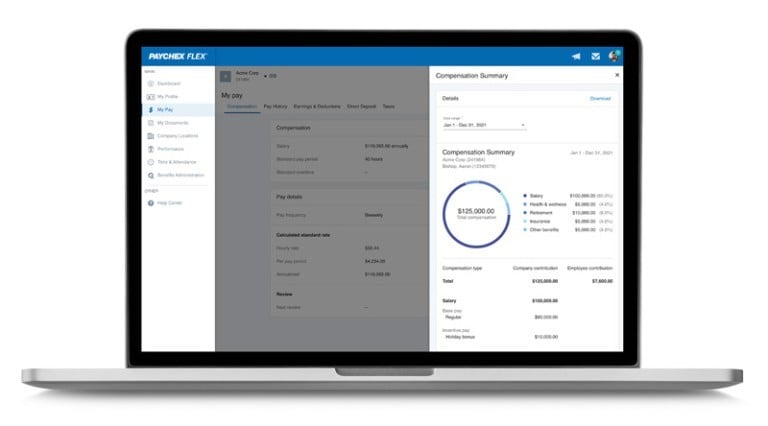- Recursos humanos
- Artículo
- Lectura de 6 minutos
- Last Updated: 01/12/2022
Hybrid Workplace: Creating a Modern Workspace

Table of Contents
According to the 2023 Pulse of HR survey, roughly half of U.S. businesses say they currently have hybrid work arrangements and plan to maintain it over the next 12 months. But, is a hybrid workplace right for your business? This article explains what makes a hybrid workspace, some of the potential pros and cons of this work arrangement, and how your business can incorporate a hybrid model into its everyday operation.
What Is a Hybrid Workspace?
The hybrid workspace is a combination of remote work with a physical, office-based presence. Businesses vary in how they structure their hybrid models, with each designing their specific hybrid workspace to their own preferences and needs. There can be a core group of full-time workers who maintain a presence in the physical office while other employees may work remotely full-time or move freely between their remote and physical office. Other businesses may require employees to be in the office for designated days each week with the remaining days spent working remotely.
Pros and Cons of a Hybrid Workplace
As with any business model, there can be both benefits and drawbacks to having a hybrid office. Employers should familiarize themselves with each, as detailed in the following sections.
Benefits of Hybrid Workplaces
Half of HR leaders from the 2023 Pulse of HR survey said their motivation for maintaining hybrid work arrangements in the aftermath of the pandemic is employee productivity and improving employee well-being. But, employers are discovering that the benefits of hybrid work are translating into tangible gains across many key business indicators. Some of these include:
- A stronger work-life balance, which can help employees feel less stressed and a greater sense of overall happiness with their lives.
- A reduced level of employee anxiety about returning to a public workplace while the pandemic oscillates between surges and declines.
- Higher levels of productivity and creativity from employees who no longer have to navigate stressful commutes and who can create an entirely customized office environment.
- Advantages for the company's bottom line, due to financial savings on real estate and office maintenance expenses.
- Access to a larger talent pool as more job seekers are looking for such flexible working environments.
- A reduction in the spread of contagious viruses, which can translate into fewer sick days, improved productivity and employee health, as well as a drop in health insurance claims.
- Lower travel-related costs by using more technology for employees across locations to collaborate remotely instead of requiring frequent and costly on-site meetings.
Drawbacks of Hybrid Workplaces
Just like conventional in-office workplaces, a hybrid office environment can come with some flaws, depending on the business. Some of the drawbacks of hybrid workplaces may not be applicable to your business; however, it's important to take them all into consideration. Some of these can include:
- Remote work may not be an option for all workers, especially frontline workers in places like hospitals, factories, law enforcement, schools, or construction.
- Some employees may prefer coming into a workplace each day and struggle with remote work.
- Not everyone has high-quality internet access and space for a designated home office.
- A business may have to invest in some training and equipment to ensure employees have what they need to perform their duties and collaborate with one another remotely.
- There are increased chances, real and/or perceived, that employees will be less "visible" to executives and miss out on opportunities that in-office employees may have.
- Managers may be unfamiliar with strategies for managing a remote workforce and require some training.
How To Incorporate a Hybrid Workplace As Your Future Working Environment
As the business landscape incorporates more remote workers, employers have had to figure out how to adopt and implement a consistent work environment that keeps workers connected, engaged, and productive. Thriving, future office environments will need consistency across both remote and in-office spaces. The following tactics can help your digital operations support a successful, hybrid office design:
- Create a schedule for employees to share onsite workspaces.
- Ensure that your collaborative technology works for everyone, everywhere.
- Take advantage of on-demand HR technology and services, such as benefit services, time and attendance, payroll, and HR support for your employees.
- Create feedback channels to help improve your hybrid workplace.
- Set key performance indicators to assess whether your workplace is operating effectively.
- Provide technological support so employees have the resources they need to troubleshoot IT issues that can interfere with getting work done.
- Set clear expectations around hours of availability.
- Consider providing a stipend to help employees set up a remote work environment that can help them stay productive.
Take Advantage of the Modern Workspace
Hybrid workplaces as part of the future of work are already here. As employees want to provide their optimum performance while balancing their home life, chances are high they will gravitate to those businesses that are operating or implementing a hybrid office workspace option. Consider working with an HR professional to help you determine whether your business would benefit from a hybrid workplace.
Tags







